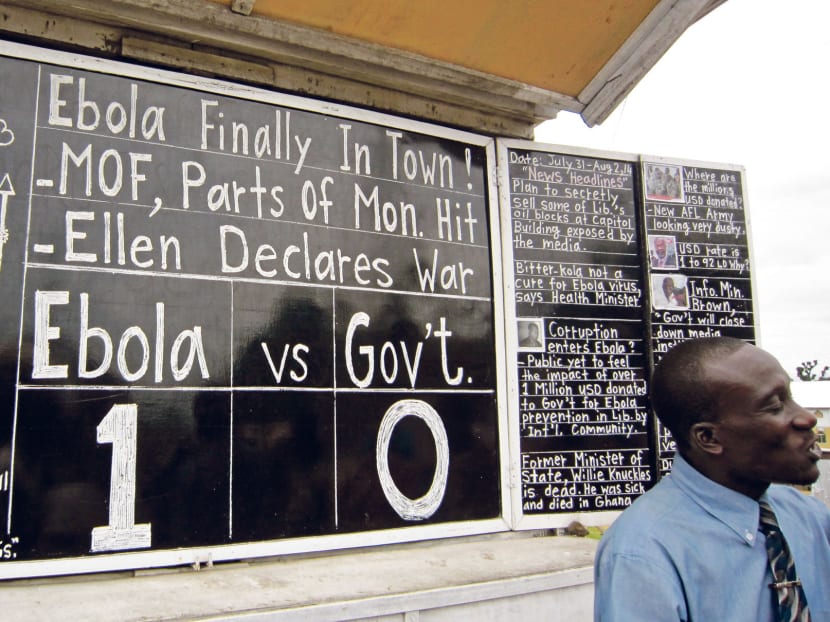WHO, Africa leaders step up efforts to combat Ebola
ABUJA (Nigeria) — The leaders of West African nations ravaged by the worst known outbreak of the Ebola virus met the head of the World Health Organization (WHO) yesterday to introduce a US$100 million (S$125 million) plan to deploy hundreds more medical professionals in support of overstretched regional and international health workers.
ABUJA (Nigeria) — The leaders of West African nations ravaged by the worst known outbreak of the Ebola virus met the head of the World Health Organization (WHO) yesterday to introduce a US$100 million (S$125 million) plan to deploy hundreds more medical professionals in support of overstretched regional and international health workers.
The gathering came a day after West African leaders seemed to quicken the pace of efforts to combat the disease, in what some analysts depicted as a belated acknowledgment that the response so far had been inadequate.
The outbreak, identified in March, has claimed 729 lives and shows no sign of abating.
WHO chief Margaret Chan told the presidents of Guinea, Liberia, Sierra Leone and Ivory Coast at the meeting in Conakry yesterday that the outbreak in West Africa is out of control but can be stopped.
“This meeting must mark a turning point in the outbreak response,” said Ms Chan, a WHO transcript showed. “This outbreak is moving faster than our efforts to control it. If the situation continues to deteriorate, the consequences can be catastrophic in terms of lost lives, but also severe socioeconomic disruption and a high risk of spread to other countries.”
The outbreak has prompted two of the three most affected countries — Sierra Leone and Liberia — to announce emergency measures including the closure of schools, house-to-house searches for infected people and the deployment of the army and the police.
One person, a traveller from Liberia, died in Nigeria, Africa’s most populous nation, which introduced airport screening of travellers from the stricken region on Thursday.
Prior to the meeting, Ms Chan had said that WHO and the Western African countries have to take the response to a new level. “This will require increased resources, in-country medical expertise, regional preparedness and coordination,” she added.
A WHO statement said the plan “identifies the need for several hundred more personnel to be deployed in affected countries to supplement overstretched treatment facilities”.
Hundreds of international aid workers and WHO specialists “are already supporting national and regional response efforts”, the statement said. “But more are urgently required. Of greatest need are clinical doctors and nurses, epidemiologists, social mobilisation experts, logisticians and data managers.”
“The plan also outlines the need to increase preparedness systems in neighbouring nations and strengthen global capacities,” the statement said. The new strategy is intended to stop the transmission of the Ebola virus within the most affected countries and to prevent the spread of the virus to neighbouring countries across the region’s largely porous borders.
Part of the plan would involve improved communication “so that people know how to avoid infection and what to do if they fear they may have come into contact with the virus”, the statement added.
The WHO called the outbreak “unprecedented” in its scale, although there has been criticism of the response so far. “The whole thing has been very incompetently handled,” said Lansana Gberie, a historian from Sierra Leone. In addition to fatalities, 1,323 confirmed and suspected cases have also been reported.
The outbreak has raised concerns far beyond Africa, despite official efforts to tamp down such fears.
US health officials have warned Americans not to travel to the three West African countries hit by the worst recorded Ebola outbreak in history. The travel advisory issued Thursday applies to nonessential travel to Guinea, Liberia and Sierra Leone.
“The bottom line is, Ebola is worsening in West Africa,” said Dr Tom Frieden, director of the Centers for Disease Control and Prevention (CDC), who announced the travel warning. He called Ebola “a tragic, dreadful and merciless virus”.
The last time the CDC issued a high-level warning was in 2003 because of a SARS outbreak in Asia. The WHO has not issued a similar travel warning for the West Africa region. AGENCIES







